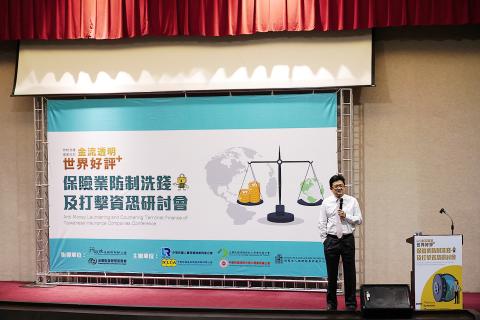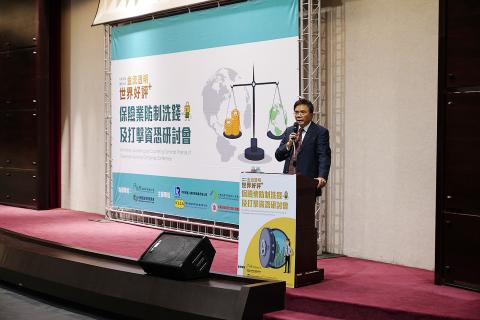The Insurance Anti-Fraud Institute (IAFI, 保險犯罪防制中心) on Friday last week held a conference in Taipei ahead of a third round of mutual evaluations by the Asia/Pacific Group on Money Laundering (APG).
As the clock ticks toward the regional intergovernmental body’s triennial test in November, the Executive Yuan’s Anti-Money Laundering Office Director Tsai Pi-chung (蔡碧仲) and Financial Supervisory Commission Vice Chairman Huang Tien-mu (黃天牧) urged the nation’s life insurers to implement what they have learned and continuously improve compliance.
While some had voiced doubts over the necessity of the office, Tsai said he feels vindicated following a case in 2016 in which US regulators fined state-run Mega International Commercial Bank (兆豐銀行) US$180 million for breaches of money laundering rules.

Photo courtesy of Insurance Anti-Fraud Institute
The landmark case sent shock waves across Taiwan’s financial sector, prompting companies to place a high priority on improving compliance with renewed fervor, Tsai said.
“Companies should refrain from adopting a defensive stance when facing checks from regulators,” Tsai said, adding that the regulators are not out to make things more difficult for businesses or their clients, but to reduce risks.
Companies should also focus on the tasks at hand and stop worrying about the challenges brought by increasingly stringent regulations, Tsai said, adding that some have gone so far as to threaten to pass on additional compliance costs to clients.

Photo courtesy of Insurance Anti-Fraud Institute
“China could take Taiwan by force and we would still have to pass the APG’s tests,” Tsai said.
Tsai wished companies that would be evaluated in November good luck, saying that the test would be a good chance for them to represent Taiwan.
Huang said the office has been instrumental in coordinating Taiwan’s policies against money laundering across different governing bodies, as well as promoting participation in international initiatives and organizations.
The commission and the government are also hoping to pass amendments to the Company Act (公司法) that would bolster compliance by tightening information disclosure rules for shareholders, Huang said.
The commission also hopes to invite compliance experts from Macau to share their insights with local life insurers, as the Chinese special administrative region has received outstanding ratings for the technical compliance of its legal framework, as well as for effectiveness in implementing measures against money laundering and terrorism financing, Huang said.
IAFI Chairman Shaw Jy-juinn (邵之雋) said that meeting money laundering regulations is unavoidable, as it is a price that Taiwan must pay to participate in international commercial trade and access global financial markets.
“In light of escalating trade wars and trade barriers being erected around the globe, the financial sector is where Taiwan can really shine,” Shaw said.
However, as Taiwan is a democracy, the government cannot adopt heavy-handed enforcement measures like China does, he said.
“Such efforts are often led by the government and a select group of high-performing companies,” Shaw said.
Building and implementing measures against money laundering and terrorism financing have been an arduous process in Taiwan, Shaw said, adding that he does not expect to see companies scrambling to prepare for the next round of evaluations.
The conference invited chief compliance officers from Taiwan’s leading life insurers to share their insights on managing high-risk investment-linked products and establishing sound record-keeping practices, as well as improving suspicious transaction reporting (STR) practices.
Life insurers are classified as being highly vulnerable to money laundering, as the products they sell are payable in local and foreign currency, Cathay Life Insurance Co (國泰人壽) chief compliance officer Kung Du-zhi (宮篤志) said, adding that the products’ value is also backed by policy reserves.
In particular, investment-linked products often require substantial premium payments upfront, creating a vulnerability when the policies are canceled by bad actors looking to receive laundered money, Kung said.
Offshore insurance units (OIU) set up by life insurers are especially vulnerable, as they receive payments in a foreign currency, Kung said, adding that risks increase when sales are processed online or by contract-sales agencies, which creates an opportunity to conduct anonymous transactions.
To bolster compliance, OIUs must enhance due diligence for higher-risk clients, such as politically exposed persons (PEPs), for example by recording clients’ statements on the purpose and source of funding on each purchase, Kung said.
Potential clients should also be checked against international business and money laundering databases, Kung said.
Companies checking for suspicious beneficiaries should keep in mind that the adult children of PEPs over the age of 40 might not always show up in international databases, he said.
Some companies have turned away and reported clients who were purchasing insurance products that exceeded their income and refused to provide an explanation, Kung said.
Kung reminds the listeners of prevalent compliance weaknesses mentioned in the already published mutual evaluation reports with 45 countries, including a lack of dedication towards money laundering prevention among the top brass at life insurance companies.
The mutual evaluation reports also mentioned a difference in the definition of a product’s beneficiary and the conditions that warrants a STR filing between life insurers and the APG, Kung said.
The outcome is that the amount of STRs being submitted is far lower than what is considered normal for the scale of a country’s insurance market, Kung said.
Most notably, many still lack a sound real-time transaction monitoring system, while many companies have not subscribed to international PEP databases, which has led to an over-reliance on customers declarations.
Lin Shang-chen (林尚禎), chief compliance officer at Taiwan Life Insurance Co (台灣人壽保險), advised companies to make sure that their computer systems meet compliance.
Financial institutions are required to keep the records on all domestic and international transactions, as well as client due diligence, for at least five years, Lin said, citing Financial Action Task Force on Money Laundering guidelines.
The records must be sufficient for a reconstruction of individual transactions, as they could be called upon as evidence in the prosecution of criminal activity, Lin said, adding that all transactions must be recorded no matter their level of risk.
The records must also be readily accessible, which could be difficult for some companies, Lin said.
Records are often scattered across subsidiaries and branches, and are stored in different databases, which could pose a problem if companies fail to meet prosecutors’ demands to produce evidence.

BYPASSING CHINA TARIFFS: In the first five months of this year, Foxconn sent US$4.4bn of iPhones to the US from India, compared with US$3.7bn in the whole of last year Nearly all the iPhones exported by Foxconn Technology Group (富士康科技集團) from India went to the US between March and last month, customs data showed, far above last year’s average of 50 percent and a clear sign of Apple Inc’s efforts to bypass high US tariffs imposed on China. The numbers, being reported by Reuters for the first time, show that Apple has realigned its India exports to almost exclusively serve the US market, when previously the devices were more widely distributed to nations including the Netherlands and the Czech Republic. During March to last month, Foxconn, known as Hon Hai Precision Industry

Taiwan Semiconductor Manufacturing Co (TSMC, 台積電) and the University of Tokyo (UTokyo) yesterday announced the launch of the TSMC-UTokyo Lab to promote advanced semiconductor research, education and talent development. The lab is TSMC’s first laboratory collaboration with a university outside Taiwan, the company said in a statement. The lab would leverage “the extensive knowledge, experience, and creativity” of both institutions, the company said. It is located in the Asano Section of UTokyo’s Hongo, Tokyo, campus and would be managed by UTokyo faculty, guided by directors from UTokyo and TSMC, the company said. TSMC began working with UTokyo in 2019, resulting in 21 research projects,

Ashton Hall’s morning routine involves dunking his head in iced Saratoga Spring Water. For the company that sells the bottled water — Hall’s brand of choice for drinking, brushing his teeth and submerging himself — that is fantastic news. “We’re so thankful to this incredible fitness influencer called Ashton Hall,” Saratoga owner Primo Brands Corp’s CEO Robbert Rietbroek said on an earnings call after Hall’s morning routine video went viral. “He really helped put our brand on the map.” Primo Brands, which was not affiliated with Hall when he made his video, is among the increasing number of companies benefiting from influencer

Quanta Computer Inc (廣達) chairman Barry Lam (林百里) yesterday expressed a downbeat view about the prospects of humanoid robots, given high manufacturing costs and a lack of target customers. Despite rising demand and high expectations for humanoid robots, high research-and-development costs and uncertain profitability remain major concerns, Lam told reporters following the company’s annual shareholders’ meeting in Taoyuan. “Since it seems a bit unworthy to use such high-cost robots to do household chores, I believe robots designed for specific purposes would be more valuable and present a better business opportunity,” Lam said Instead of investing in humanoid robots, Quanta has opted to invest